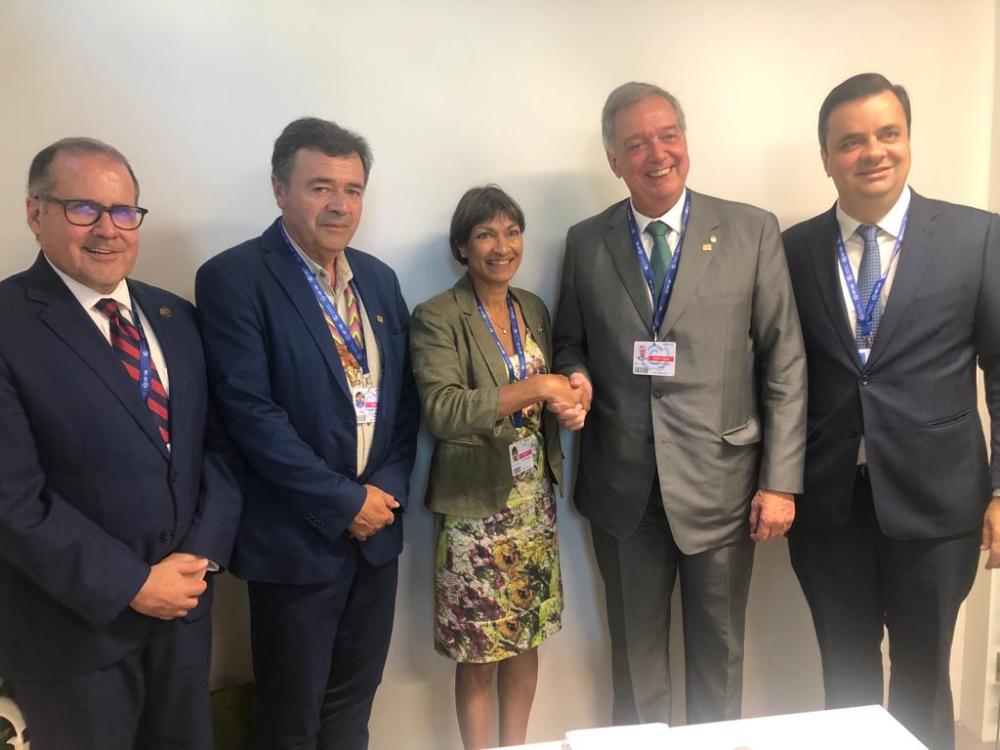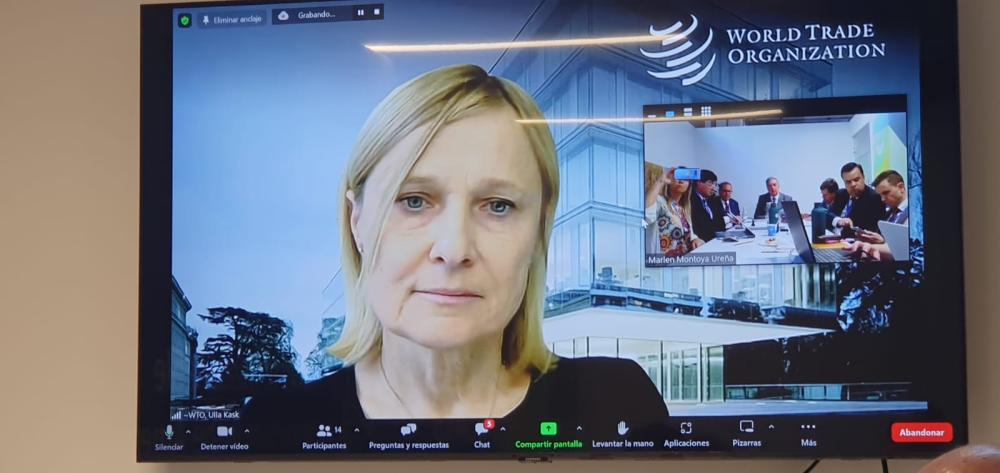The ministers expressed concern about the circulation in Argentina and Uruguay of a new pathology that has been affecting horses, which is also a zoonosis and that can affect people.

Dubai, United Arab Emirates, December 9, 2023 (IICA) – Ministers of Agriculture and senior sector officials from the governments of Argentina, Brazil, Chile, Uruguay and Paraguay held a meeting at the largest climate negotiation forum in the world, the COP28, which is held in the United Arab Emirates, in which they agreed to strengthen reciprocal cooperation before the European Green Deal, aiming to certify and guarantee the sustainability and good practices of agricultural production in the countries of the region.
In a segment of the meeting, led by the president of the Southern Agricultural Council (CAS) and Minister of Livestock, Agriculture and Fisheries of Uruguay, Fernando Mattos, the Special Representative for Agriculture of Australia, Su McCluskey, participated. Separately, the ministers also spoke with Ulla Kask, Counselor of the Agriculture and Commodities Division of the World Trade Organization (WTO).
Together with Minister Mattos, who chairs the CAS, a ministerial forum for consultation and coordination of regional actions, the Minister of Agriculture of Chile, Esteban Valenzuela, was at the meeting; the Secretary of Commerce and International Relations of the Ministry of Agriculture and Livestock of Brazil, Roberto Perosa; the Director of Planning of the Ministry of Rural Development and Lands of Bolivia, Blas Mamani; the Director of Multilateral Negotiations of the Ministry of Agriculture, Livestock and Fisheries of Argentina, Maximiliano Moreno, and the General Director of Planning of the Ministry of Agriculture and Livestock of Paraguay, Leticia Torres.
The Deputy Director General of the Inter-American Institute for Cooperation on Agriculture (IICA), Lloyd Day, participated in the meeting on behalf of the Director General, Manuel Otero, who traveled to Argentina to participate in the transfer of command in his native country. Gabriel Delgado, IICA Representative in Brazil and coordinator of the Southern Region, also represented the hemispheric organization, which serves as the Technical Secretariat of the CAS.
Senior officials from the Ministries of Agriculture of the region also participated in the meeting, such as the director of the Office of Agricultural Programming and Policy (Opypa) of the Ministry of Livestock, Agriculture and Fisheries of Uruguay, Verónica Durán; the Director of Trade and Investment Promotion of the Ministry of Agriculture and Livestock of Brazil, Marcel Moreira; and the director and deputy director of the Office of Agrarian Studies and Policies (Odepa) of Chile, Andrea García and Daniela Acuña.
The president of the Brazilian Agricultural Research Company (EMBRAPA), Silvia Maria Fonseca Silveira Massruhá, also attended the meeting.
“It is the first CAS meeting to be held outside of our region, and in an event as important as a COP, in which climate change and its relationship with our agricultural production is debated,” said Mattos when opening the meeting, who, on behalf of his colleagues, saluted the outgoing management of the Secretary of Agriculture of Argentina, Juan José Bahillo, and wished the greatest success to Fernando Vilella, who from December 11 will be his replacement.
The ministers expressed concern about the circulation in Argentina and Uruguay of a new pathology that has been affecting horses, which is also a zoonosis and that can affect people.
It is “equine encephalomyelitis, a virus that has circulated in the region, which is affecting both Argentina and Uruguay, which has already declared several outbreaks and is causing damage to horses and generates a real threat of a potential health problem. human,” Mattos explained.
Due to this situation, the CAS asked the Permanent Veterinary Council (CVP) of the region to prepare a report on the new pathology, focused on what challenges this zoonosis presents at a time when climate variability puts health systems to the test and requires these greater coordination.
More cooperation and exchange of information and coordinated action
The ministers expressed their concern about the gradual weakening of the multilateral trading system and noted that the agricultural sector, key to the world’s food security, does not have the weight it should within the World Trade Organization, while the dimension environmental incorporates additional demands, with potential impact on exchange flows.
In this sense, they spoke with the Australian official Su McCluskey about greater interaction between the member countries of the CAS and the nation of Oceania to discuss at a global level the elimination of distorting subsidies to trade, with the possibility of a relaunch of the Cairns Group, created in 1986 and which brings together agricultural exporting countries that exert pressure to liberalize trade in agricultural products.
The CAS ministers expressed that free trade is the instrument to achieve resilient, sustainable and efficient food systems that contribute to ending food insecurity at a global level. For this reason, they considered that agricultural reform is one of the most effective ways in which the WTO can contribute to achieving environmental objectives, given that achieving more sustainable agricultural systems is a fundamental instrument for the fight against climate change.
Thus, in the dialogue with the representative of Australia, the CAS ministers highlighted the importance of this country’s leadership in the Cairns Group and stressed the need to advance the reform process mandated in Article 20 of the Agreement on Agriculture of the WTO, particularly in the pillars of Market Access and Domestic Support.

Secretary Perosa, for his part, reviewed recent conversations between Brazil and the European Union regarding the implementation of the Green Deal and the possible use of a platform developed in the South American nation for the mapping of land uses and collection of information on land conditions. production based on satellite images and georeferencing. Brazil reported on its willingness to share the platform as a mechanism for presenting conformity of Mercosur production.
Minister Valenzuela referred to trade between Chile and the European Union and director Moreno, for his part, highlighted the articulation and convergence between the Mercosur countries regarding the European Green Deal and requested the coordinated participation of the region in the next Green Week which will be held in Berlin, Germany, next January.
More information:
Institutional Communication Division.
comunicacion.institucional@iica.int











